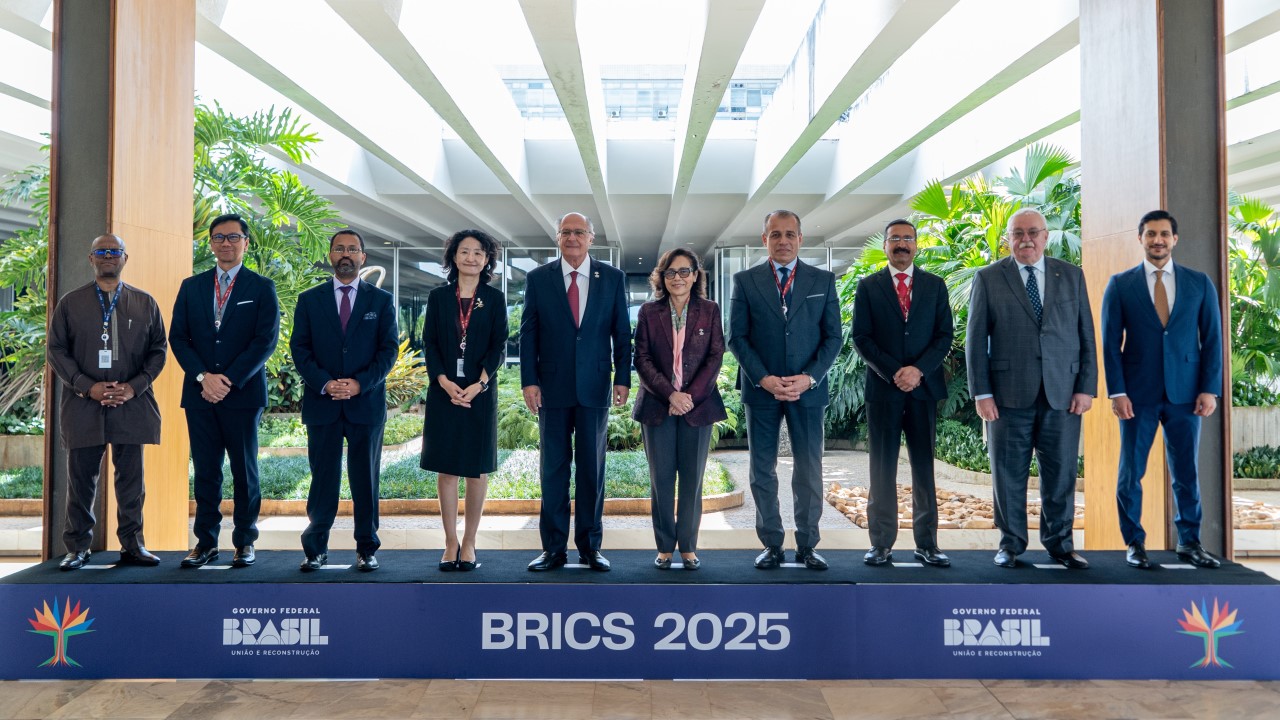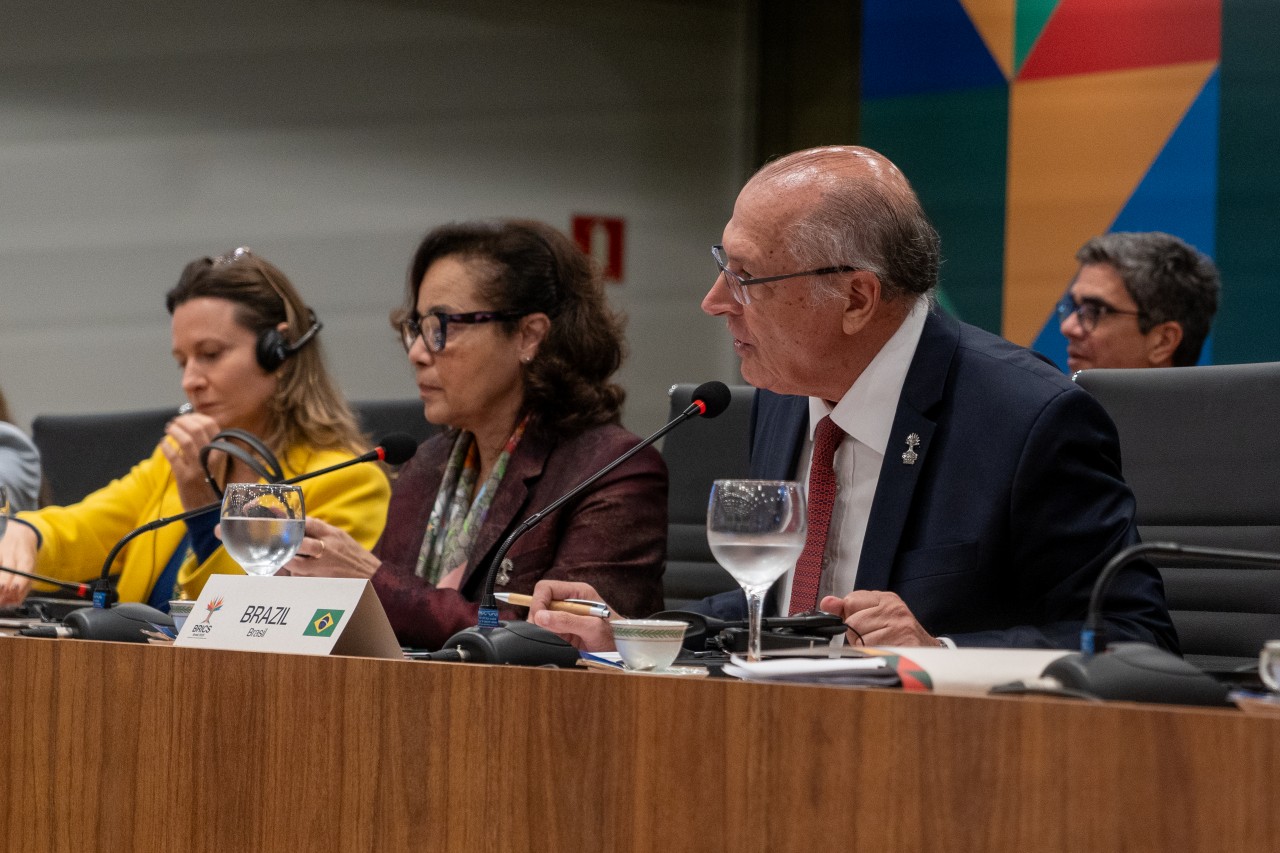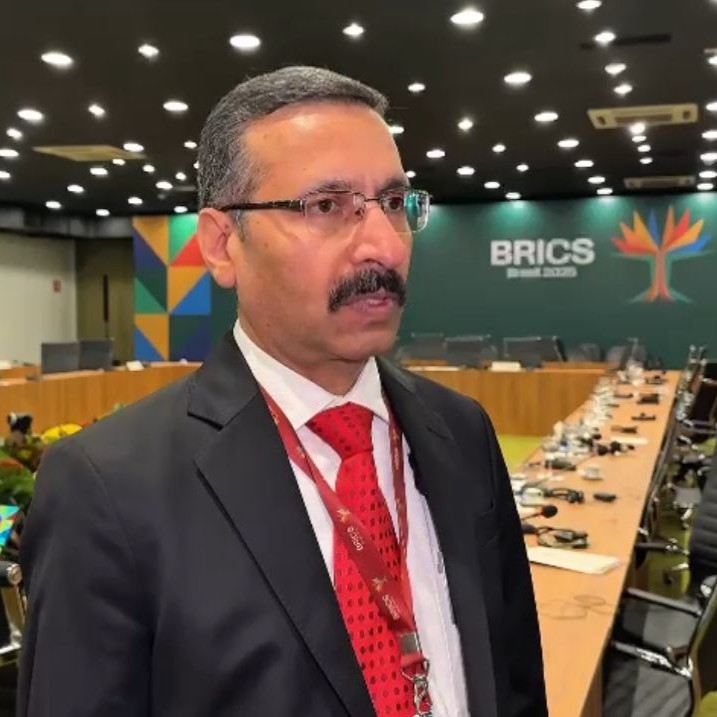BRICS approves Joint Declaration for fairer, more inclusive global trade
Against the tide of protectionism, BRICS raises the banner of inclusive trade: the group’s trade ministers reach agreement on WTO reform, the digital economy, and the 2030 Economic Partnership

By Inez Mustafa | inez.mustafa@presidencia.gov.br
Emphasizing the importance of economic cooperation and multilateralism, the Ministers of the BRICS Contact Group on Economic and Trade Issues approved a Joint Declaration this Wednesday, May 21. Under the leadership of the Ministry of Development, Industry, Trade and Services, the declaration outlines three priority areas: strengthening the multilateral trading system and reforming the World Trade Organization (WTO), renewing the BRICS 2030 Economic Partnership Strategy, and the digital economy.
Geraldo Alckmin, Vice President of Brasil and Minister of Development, Industry, Trade and Services, stated that the topics discussed among BRICS countries promote a fairer, more inclusive, and more effective global trade system, especially in a moment marked by the rise of restrictive and protectionist economic measures. According to Alckmin, such measures create tensions and disruptions in global trade, exacerbating economic disparities between countries. He reaffirmed the commitment of Brasil and the BRICS member states to the multilateral trade system as a means of resolving these issues.
“Today, we are not just gathered around negotiation tables, but around the possibility of a more prosperous future. I am fully confident that our discussions, guided by cooperation and a commitment to the common good, will yield significant advances for global trade and investment,” the Vice President stated.
Maria Laura da Rocha, Secretary-General for Foreign Affairs of Brasil, highlighted the unique position of the group to respond to global challenges, with a focus on the development of the Global South. “Our priorities include topics that can have a direct impact on the lives of our citizens, such as greater integration of our economies, facilitating trade and investment among BRICS countries,” Rocha affirmed.

WTO reform
The ministers approved the BRICS Declaration on WTO Reform and Strengthening the Multilateral Trading System. According to the group, reform is necessary to reflect the transformations of the global economy, as Brasil, South Africa, Saudi Arabia, China, Egypt, the United Arab Emirates, Ethiopia, India, Indonesia, Iran, and Russia represent 39% of the global economy and 24% of international trade, according to the declaration.
Shri Yashvir Singh, Economic Adviser (Department of Commerce, Government of India), emphasized that the declaration underlines the importance of promoting an inclusive, equitable, transparent, and non-discriminatory rules-based multilateral trading system. “Since major reforms are not being easily implemented — especially the restoration of the WTO Appellate Body — we have proposed some incremental reforms to improve the functioning of the organization, its committees, and councils,” said the minister.

In the declaration, the BRICS trade ministers expressed concern over the increase in unilateral tariff and non-tariff measures, as they distort trade and are inconsistent with WTO rules. Alckmin explained that the rise in trade-restrictive actions reduces global trade, disrupts global supply chains, and introduces uncertainty into international economic and commercial activities. “This reform must also address the development issues we defend here,” he emphasized.
The reform of international financial institutions, such as the WTO, is mentioned both in the group’s Joint Declaration and in the first BRICS declaration of 2009 — the Yekaterinburg Declaration — evincing the topic’s longstanding relevance for the group. According to the Indian minister, the issue will continue to be addressed in 2026, during India’s presidency of BRICS, with an emphasis on the reform of The Appellate Body of the World Trade Organization.
BRICS 2030 Economic Partnership Strategy
First adopted under Russia’s presidency in 2020, the strategy aims to guide the group’s economic cooperation. Its renewal includes five priorities for cooperation among BRICS members over the next five years: the multilateral trading system, digital economy, international trade and investment, financial cooperation, and sustainable trade and development.
“The update and renewal of this strategy represent a significant advance in BRICS cooperation, as it strengthens and develops mechanisms that reduce transaction costs and facilitate investment and trade flows among the group’s countries,” emphasized the Secretary-General.
Adjusted to the current global context, the strategy underscores the importance of trade facilitation as a concrete BRICS response to the current fragmentation of international trade, encouraging cooperation, and boosting intra-bloc trade, added the Vice President.
Another key element of the BRICS 2030 Economic Partnership Strategy is the connection between trade and the environment. “In the year when Brasil will host COP30, we affirm that there can be no development without ecological integrity, nor social progress without a green economy,” Alckmin emphasized. Discussions on sustainable trade and development offer BRICS a strategic roadmap for engaging on shared interests, exchanging experiences, and identifying opportunities for joint action, concluded the minister.
Digital governance
To tackle the dual challenge of bridging digital and data divides in the Global South, the Joint Declaration proposes mechanisms to improve data flows among BRICS countries, recognizing that data exchange is essential for the socioeconomic development of nations. Alckmin reiterated that “the digital economy has become a strategic pillar of global development, with data as its key asset.”
He added that regulatory fragmentation and the lack of consensus on data flows limit the full participation of developing countries. In this regard, “the Brazilian presidency proposed a BRICS understanding on data economy governance with an open, fair, and active framework that promotes digital inclusion, sovereignty, and security,” he stated. The aim is to support digital transformation among BRICS nations, increase innovation, and ensure that the benefits of the data economy are within everyone’s reach, the Vice President concluded.
Translation Luana Ferreira de Freitas UFC/POET
Proofreading Judas Tadeu de Azevedo Neto UFC/POET